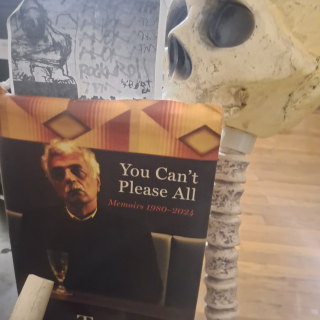Sandra Kienzler (Léa Seydoux) is a widowed young mother raising her daughter Êlodie (Sarah Le Picard) alone, while also caring for her sick father Michel (Pierre Meunier). She’s dealing with the loss of the relationship she once had with her father, while fighting to get him the care he requires. At the same time, Sandra reconnects with Clément (Melvil Poupaud), a friend she hasn’t seen in a while and, although he’s married, their friendship soon blossoms into a passionate affair.
This is the inner tension of the film, the temptation to be self destructively melancholic crossed with a way of embracing life, of embracing fate. In the first scene, Sandra is stuck at her father's door; she has difficulty entering the film, and we sense that her journey will be difficult. When you're a mother living in Paris with limited means, this space is rarely protected. Sandra lives in a studio and sleeps in her living room. Georg (Pascal Gregory) rents a small, charming apartment but as soon as he leaves it, it goes back to its owners. His belongings are liquidated and his whole life suddenly disappears. From then on, Georg will never have a place of his own. In hospitals or old people's homes, it's a continuous ballet of people coming in and out of your room. In addition, Georg has to change places four times; finding an affordable and decent nursing home in Paris seems almost impossible. For the family, it’s important that the nursing home not be too far away, so that they can visit him regularly.
Georg and Sandra share a common need for love. Even when Georg's mind goes blank, he remains aware that he loves one person, his companion Leia (Fejria Deliba). He misses her constantly and is afraid that he’ll never see her again. Love is also vital for Sandra, for her daughter, for her father, and then for Clément, who will become central. Putting love at the very heart of existence, the vulnerability that comes with it, is maybe also what continues to bring Georg and Sandra together, when they can no longer communicate.
In one way or another, love connects the characters in the film. This is also true of Sandra's mother Françoise (Nicole Garcia), she seems more detached, but she's very present for her daughter and for Georg even though they've been separated for 25 years. It's a story of what it’s like being in mourning for someone whose still alive. Georg is no longer the father Sandra knew, but he's still present. Even if his mind goes, a part of him, his sensibility, his being, remains.
The film wants to explore how two opposing feelings, a sense of grief and rebirth, can dialogue, experiencing them simultaneously. Even if it’s unstable, what Sandra and Clément have together is above all a joy. With her father, it’s only suffering. However, the question of self-sacrifice is central, Sandra does not express her feelings much, but she helps her father to find his words.
Sandra is caught up in what she's experiencing. Her daily life is full of duties, to her father, to her daughter, to her job as a translator, which consists of conveying the thoughts of others, to take a back seat to the words of others. There are few moments when she can express her feelings. Because she always tries to get her father to speak during her visits, because she is devoted to him, to him expressing his fears, his suffering, she cannot tell him what she is going through. As for her relationship with Clément, it's first and foremost a relationship based on passion, with little space for words. Sandra is able to assert herself most in physical love, more than in words.
The question of memory runs through the film: it slips away from Georg who struggles to recover it, and Sandra's mother seems to need to unburden herself of the past. Paradoxically, memory is on the father's side. But they can no longer even share in that, because the music hurts Georg, by sending him back to a past life he no longer has access to. Then on the way back from the nursing home, in the bus, the music comes back to Sandra, she carries this music inside her, she tries to find her father through it. It's a somewhat mystical feeling; perhaps a secret communication is still possible with her father through the Schubert sonata (D959).
The uncertainty makes things even more painful. For example, the scene where Georg seems to want to express the wish to be euthanized by his daughter, at one moment it seems clear, and in the next everything becomes confused again, you can never be sure of his intentions. Georg also loses the taste for the things he loved, like hat his daughter has him listen to. The scene where Georg doesn’t want to listen to Schubert anymore is at the heart of the film. We’d like to think that it’s still possible to derive pleasure where you find a melancholy as well as a speed, which goes with walking, which is recurrent in the film.
The character of Clément (Melvil Poupaud) is not idealized despite his adventurer’s life that lends itself at first to fantasizing. He even seems guilty of some shortcomings in his relationship with Sandra. As for Clément's guilt. It's true that we see a man who cheats on his wife for a while. Some may condemn him, that's not the way we see it. A long-term relationship is ending for him, he brought it up, and another that's born, which surprises him, as well as the difficulty of breaking up a home. His relationship with Sandra becomes a passion, Clément can’t resist it. At the same time, he dithers. It’s only human. The fact that he's not able to free himself from his wife overnight and that. He’s not strong enough to stop seeing Sandra, is not a source of indignation for me. It’s not an obvious choice, he needs time, and it can also be seen as a proof of sensitivity. In love with a woman while living with another, Clement finds himself in a situation that is either banal or universal, depending on how you look at it. Either way, it’s just as painful. In the end, he makes the decision to live with Sandra, who won’t have waited for him in vain.
The motif of the 'room of one's own', the space of preserved intimacy, is everywhere: Sandra has to share a house with her lover and her daughter, and the disoriented residents of the nursing home constantly barge into Georg's room. We find it also in Rohmer's work. The arc of the film is there, from Georg’s closed door to a horizon that opens up at the end for Sandra. In the end, Sandra must free herself from her father to return to life, there's something selfish yet necessary in this. She embraces the happiness that's offered to her, but it's through a form of abandonment. And in the last scene, the horizon is open, and Clément's words to Sandra's daughter ('Your home is straight ahead') sound like an echo of the beginning of the film.
The film shows emotional relationships haunted by lack, absence. People can feel this disappearance and this subsistence at the same time. But it's often difficult to distinguish between what makes sense and what doesn’t. How can you know what expresses an intention, and what's only due to a mental disorder? It shows the visceral link that goes beyond illness, to tell the story of this strange mourning in order to better understand it, and to overcome the suffering that clouds everything for a long time.
Opens on March 17 at Gateway




